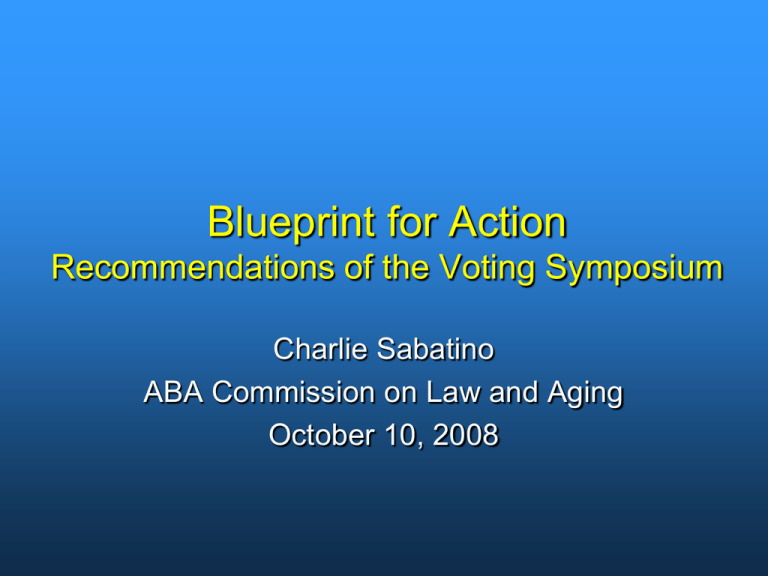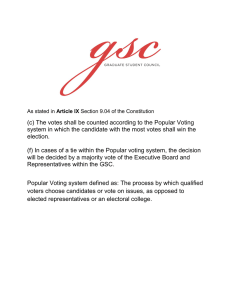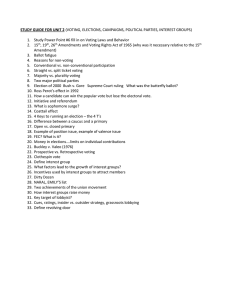PowerPoint presentation by Charlie Sabatino,
advertisement

Blueprint for Action Recommendations of the Voting Symposium Charlie Sabatino ABA Commission on Law and Aging October 10, 2008 Dual concerns • Where and how to draw the line between enabling voting by those who can and preventing voting for those who should not – Creatively facilitating voting, especially in residential facilities, by those who can – Protecting election integrity by preventing fraud Search for Answers • Pacific McGeorge Law School Symposium – March 2007 – Invited multidisciplinary experts – Commissioned 6 papers [published at 38 McGeorge L. Rev. Issue 4 (2007)] – Facilitated discussion – Recommendations of the Symposium • ABA action – August 2007 • See www.abanet.org/aging/voting/ Symposium Organization Five Working Groups 1. The “Big Picture”: How Aging and Cognitive Impairment Fits into the Broader Issues of Access to Voting 2. Defining and Assessing Capacity to Vote 3. Absentee Balloting 4. Long-Term Care 5. Technology Major Issues • In what ways, if at all, should persons with impairment be treated differently? • Who should determine intent, or capacity, to vote? How to define? • How large is the risk of fraud to the harm of exclusion? • Is absentee balloting the best accommodation? • What are the barriers, risks, and opportunities in long-term care facilities? • What opportunities or dangers does technology offer? Recommendations Addressed Changes in statute or regulation Changes in practice Education Further study I. Big Picture Principles • Society facilitate access while preserving integrity. • PwD should not be held to a different or higher standard. • Public & private entities must provide reasonable accommodations to ensure access to voting. • Goal 1: Prevent unfair &/or unlawful exclusion. • Goal 2: Maximize access by adequate & appropriate assistance. • Goal 3. Improve administration to facilitate voting by all individuals, particularly people with cog. Imp. • Goal 4: Ensure individuals with cog. Imp. have the opportunity to register to vote. II. Major Resolutions – Capacity • Persons with cog. imp. should be treated no differently than others (Principle) • No disqualification on the basis of medical diagnosis, disability status, or residence • Presumption of capacity to vote • If state law permits exclusion based on incapacity, removal only by specific determination established by C&C evidence in a full judicial proceeding • Incapacity standard: only if cannot communicate, w/ or w/o accommodations, a specific desire to participate in the voting process III. Major Resolutions – Absentee Balloting • All jurisdictions should permit voters the open-ended choice to “vote at home” • Default presumption: vote where reside, with choice by LTC residents • Signature verification accommodation needed • More information – simple and accurate – for voters and those who assist re how to vote at home and how to assist IV. Major Resolutions – LTC Facilities • Long range: Mobile Polling • Require election officials, not facility staff, to oversee voting • Require Facilities to inform/assist residents with registration, and in absence of mobile polling, to offer assistance with absentee voting. • Clarify responsibilities of anyone who assists: – No authority to assess capacity – Assistance limited to assisting voter to express intent – If unable to determine voter’s intent, no vote • Accept facilities’ ID of residents as sufficient verification V. Major Resolutions – Technology • Plain language/multiple formats election materials • Assistive technology, universal accessibility & design of all polling places & voting machines • Innovative opportunities to register (online) • Quality development for usability/accessibility of technology • Aim: persons with any disability (physical, sensory, cognitive, intellectual, or mental) can vote privately and independently on any machine. More Resolutions – Research & Education • Research – Ballot formats, effective communication, & technologies – Impact of current law & practical barriers – Voting practices of disabled populations – Signature verification procedures & options • Education of poll workers, judges, facility staff, family, guardians to address needs of voters with cognitive impairments & how to assist Some Actions to Consider • • • • • Guidelines for judges in assessing voting capacity Vote at home option (no-excuse/permanent) Review signature verification procedures Mobile polling demonstration More guidance in NH licensure re facilities obligations • Educational materials for assisting voters with cog. Imp. And for voting in LTC facilities. • Poll worker training re disabilities including cog. imp.




